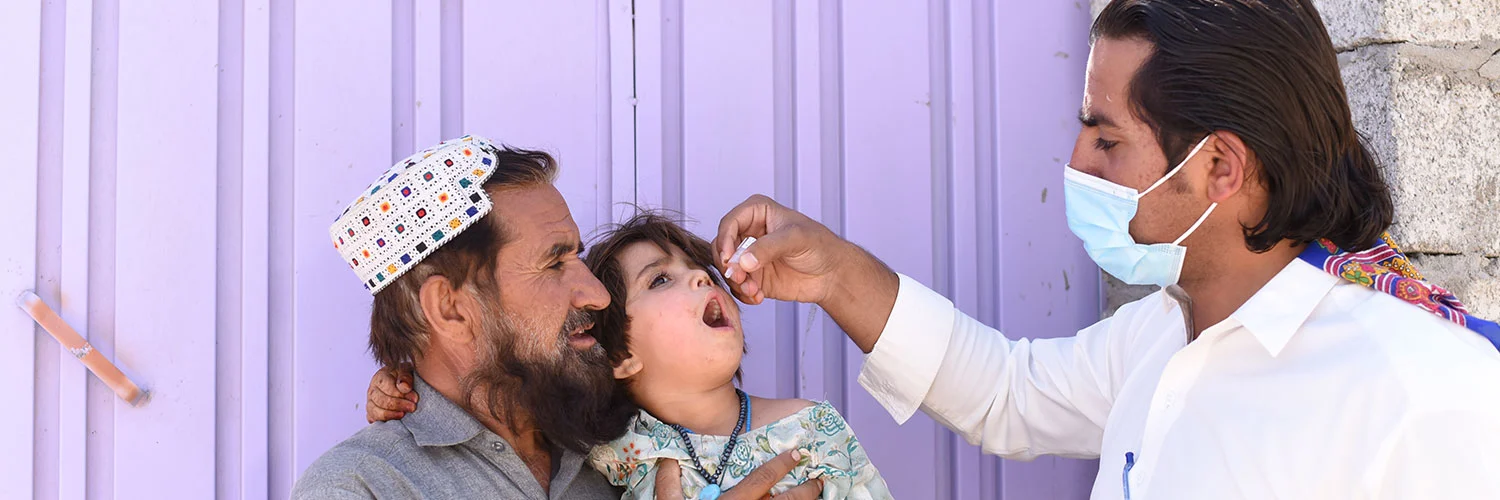Says commitment to polio eradication remains commendable, interruption of wild poliovirus is possible in six months with support from communities, government, administrative and security leadership
ISLAMABAD, JULY 21, 2023 – A high-level delegation of the Global Polio Eradication Initiative (GPEI), including the Polio Oversight Board, visited Pakistan to discuss the impact of political transition on eradication efforts and the strategies in place to vaccinate children that remain unreached in the polio-endemic districts of southern Khyber Pakhtunkhwa.

Led by Dr Chris Elias, Chair of the Polio Oversight Board and President Global Development, Bill & Melinda Gates Foundation, the delegation included WHO Regional Director for the Eastern Mediterranean Region Dr Ahmad Al-Mandhari, UNICEF South Asia’s Deputy Regional Director Noala Skinner, CDC’s Polio Eradication Branch Chief Dr Omotayo Bolu, Chief Programme Strategy Officer from Gavi-the Vaccine Alliance, Aurelia Nguyen, Trustee of Rotary International Foundation Aziz Memon, and High Commissioner of Canada in Pakistan Leslie Scanlon, who represented all donors to the GPEI.

This was the first visit by the POB and representatives from all GPEI partners to Pakistan in 2023. The POB is the highest decision-making and oversight body of the GPEI.
During the four-day visit from 16 – 20 July that included Lahore, Peshawar and Islamabad, the delegates visited the National and Provincial Emergency Operations Centers, attended a meeting of the National Task Force on Polio Eradication, and held separate meetings with the leadership of the Pakistan Army, Health Minister Abdul Qadir Patel and Foreign Minister Bilawal Bhutto Zardari.
“Pakistan continues to make important progress in the fight to eradicate polio. I'm impressed by the commitment I've seen again this week from the federal and provincial governments in getting the job done,” said POB Chair Dr Chris Elias. “The experience globally is that strong government leadership is key in the final push to defeat polio.”
The delegation also met the Governor of Punjab, Chief Minister of Khyber Pakhtunkhwa and provincial chief secretaries, health secretaries, commissioners and deputy commissioners of priority districts of Punjab and Khyber Pakhtunkhwa in Lahore and Peshawar, respectively, and met with the Chief Secretary of Balochistan.

“While the challenges before us are formidable and complex, I remain cautiously optimistic about the goal of interrupting transmission of poliovirus in Pakistan by the end of this year. This will require solidarity and collective action at all levels to enable rigorous implementation of the strategy, that must be fully supported by communities and the political, administrative and security leadership,” said WHO Regional Director Dr Ahmed Al-Mandhari.
Endemic transmission of wild poliovirus remains restricted to seven districts in the south of Khyber Pakhtunkhwa province, namely Tank, Bannu, North Waziristan, South Waziristan Upper, South Waziristan Lower, DI Khan and Lakki Marwat.
A vaccination campaign is ongoing in the seven endemic districts named “Reaching the Unreached.” The campaign specifically targets over 270,000 children under five in 69 low-performing union councils where vaccine coverage for polio and other essential immunization has been inadequate.
“Under our regional vision of health for all by all, WHO will continue supporting Pakistan’s polio programme to give our future generations a world free from polio,” Dr Al-Mandhari added.
UNICEF’s Deputy Regional Director Noala Skinner appreciated the leadership. “We applaud the leadership of Pakistan and the dedication of frontline workers, including thousands of women, who tirelessly vaccinate and protect millions of children from the deadly poliovirus,” she said, adding, “The next six months are critical for Pakistan’s efforts to eradicate polio. We are so close to our goal of reaching all children with polio vaccines. Together, we must ensure that the programme is able to reach every child in Pakistan, regardless of where they live.”

